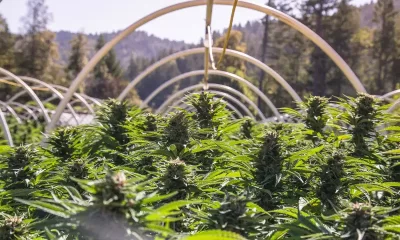Business
California Governor Passes Two Medical Cannabis Patient Protection Bills

California Gov. Gavin Newsom recently signed two bills that protect medical cannabis patients, with many more bills to be considered by Sept. 30.
On Sept. 2, California Gov. Gavin Newsom signed Assembly Bill 1954 and Senate Bill 988.
Assembly Bill 1954, which was introduced by Assemblymember Bill Quirk, will protect medical cannabis patients from being discriminated against by physicians and surgeons due to testing positive for THC.
According to Cal NORML Director Dale Gieringer, AB-1954 will clarify the rules on patient cannabis use for physicians. “Many physicians are under the mistaken impression that they can’t prescribe medication to patients who test positive for cannabis,” Gieringer said. A NORML article specifies that many California health plans require patients to sign agreements stating that they will not use illegal substances during their treatment, and must agree to drug testing. Prior to this bill, NORML found that 18.5% of patients were denied prescription medication treatment due to a doctor becoming aware of their cannabis use.
“It is irresponsible and unethical for pain management programs to eliminate patients who are using medical cannabis for their chronic pain, because there is conclusive scientific evidence that cannabis is a safe and effective treatment for chronic pain,” physician Larry A. Bedard told NORML. Through the passage of AB-1954, physicians won’t be punished if their patients consume cannabis.
The second bill, Senate Bill 988, was introduced by Sen. Ben Hueso as an amendment to the existing bill known as either the Compassionate Access to Medical Cannabis Act, or Ryan’s Law. “The bill would require a health facility to require a patient or a primary caregiver, as defined, to be responsible for acquiring, retrieving, administering, and removing medicinal cannabis and would require medicinal cannabis to be stored securely at all times,” the summary states. “The bill would require the patient or the patient’s primary caregiver to, upon discharge, remove all remaining medicinal cannabis and, if a patient cannot remove the medicinal cannabis and does not have a primary caregiver, would require the storage of the product in a locked container until it is disposed of, as specified.”
Newsom also has a number of other cannabis-related bills to consider signing, which he has until September 30 to sign. This includes bills that allow medical cannabis delivery in local jurisdictions, establish an automatic record-sealing statue, require the Department of Social Services to treat medical cannabis use similarly to alcohol or prescribed medication, allow veterinarians to recommend cannabis to pets, allow cannabis event licenses to take place where alcohol is sold, and a proposal to allow interstate cannabis commerce from California to other legal states.
Most recently, lawmakers gave final approval to Assembly Bill 2188. If Newsom signs AB-2188, it would make it unlawful for an employer to discriminate against a person for cannabis use while off the clock. This applies to the “hiring, termination, or any term or condition of employment, or otherwise penalize a person.”
If passed, California would become the seventh state to implement protections for cannabis-consuming employees. According to Quirk, who is also the author of AB-2188 in addition to the previously mentioned AB-1954, the bill only protects off duty employees. “Nothing in this bill would allow someone to come [to work] high,” Quirk explained to ABC News in an interview.
A few weeks ago, Newsom vetoed a bill that would allow safe injection sites in an effort to prevent drug overdoses. The author of Senate Bill 57, Senator Scott Wiener, emphasized the importance of prevention with a bill like his. “Every overdose death is preventable,” Wiener said. “We have the tools to end these deaths, get people healthy, and reduce harm for people who use drugs. Right now, we are letting people die on our streets for no reason other than an arbitrary legal prohibition that we need to remove. SB-57 is long overdue, and will make a huge impact for some of the most vulnerable people in our community.”
Source: https://hightimes.com/news/california-governor-passes-two-medical-cannabis-patient-protection-bills/
Business
New Mexico cannabis operator fined, loses license for alleged BioTrack fraud

New Mexico regulators fined a cannabis operator nearly $300,000 and revoked its license after the company allegedly created fake reports in the state’s traceability software.
The New Mexico Cannabis Control Division (CCD) accused marijuana manufacturer and retailer Golden Roots of 11 violations, according to Albuquerque Business First.
Golden Roots operates the The Cannabis Revolution Dispensary.
The majority of the violations are related to the Albuquerque company’s improper use of BioTrack, which has been New Mexico’s track-and-trace vendor since 2015.
The CCD alleges Golden Roots reported marijuana production only two months after it had received its vertically integrated license, according to Albuquerque Business First.
Because cannabis takes longer than two months to be cultivated, the CCD was suspicious of the report.
After inspecting the company’s premises, the CCD alleged Golden Roots reported cultivation, transportation and sales in BioTrack but wasn’t able to provide officers who inspected the site evidence that the operator was cultivating cannabis.
In April, the CCD revoked Golden Roots’ license and issued a $10,000 fine, according to the news outlet.
The company requested a hearing, which the regulator scheduled for Sept. 1.
At the hearing, the CCD testified that the company’s dried-cannabis weights in BioTrack were suspicious because they didn’t seem to accurately reflect how much weight marijuana loses as it dries.
Company employees also poorly accounted for why they were making adjustments in the system of up to 24 pounds of cannabis, making comments such as “bad” or “mistake” in the software, Albuquerque Business First reported.
Golden Roots was fined $298,972.05 – the amount regulators allege the company made selling products that weren’t properly accounted for in BioTrack.
The CCD has been cracking down on cannabis operators accused of selling products procured from out-of-state or not grown legally:
- Regulators alleged in August that Albuquerque dispensary Sawmill Sweet Leaf sold out-of-state products and didn’t have a license for extraction.
- Paradise Exotics Distro lost its license in July after regulators alleged the company sold products made in California.
Golden Roots was the first alleged rulebreaker in New Mexico to be asked to pay a large fine.
Source: https://mjbizdaily.com/new-mexico-cannabis-operator-fined-loses-license-for-alleged-biotrack-fraud/
Business
Marijuana companies suing US attorney general in federal prohibition challenge

Four marijuana companies, including a multistate operator, have filed a lawsuit against U.S. Attorney General Merrick Garland in which they allege the federal MJ prohibition under the Controlled Substances Act is no longer constitutional.
According to the complaint, filed Thursday in U.S. District Court in Massachusetts, retailer Canna Provisions, Treevit delivery service CEO Gyasi Sellers, cultivator Wiseacre Farm and MSO Verano Holdings Corp. are all harmed by “the federal government’s unconstitutional ban on cultivating, manufacturing, distributing, or possessing intrastate marijuana.”
Verano is headquartered in Chicago but has operations in Massachusetts; the other three operators are based in Massachusetts.
The lawsuit seeks a ruling that the “Controlled Substances Act is unconstitutional as applied to the intrastate cultivation, manufacture, possession, and distribution of marijuana pursuant to state law.”
The companies want the case to go before the U.S. Supreme Court.
They hired prominent law firm Boies Schiller Flexner to represent them.
The New York-based firm’s principal is David Boies, whose former clients include Microsoft, former presidential candidate Al Gore and Elizabeth Holmes’ disgraced startup Theranos.
Similar challenges to the federal Controlled Substances Act (CSA) have failed.
One such challenge led to a landmark Supreme Court decision in 2005.
In Gonzalez vs. Raich, the highest court in the United States ruled in a 6-3 decision that the commerce clause of the U.S. Constitution gave Congress the power to outlaw marijuana federally, even though state laws allow the cultivation and sale of cannabis.
In the 18 years since that ruling, 23 states and the District of Columbia have legalized adult-use marijuana and the federal government has allowed a multibillion-dollar cannabis industry to thrive.
Since both Congress and the U.S. Department of Justice, currently headed by Garland, have declined to intervene in state-licensed marijuana markets, the key facts that led to the Supreme Court’s 2005 ruling “no longer apply,” Boies said in a statement Thursday.
“The Supreme Court has since made clear that the federal government lacks the authority to regulate purely intrastate commerce,” Boies said.
“Moreover, the facts on which those precedents are based are no longer true.”
Verano President Darren Weiss said in a statement the company is “prepared to bring this case all the way to the Supreme Court in order to align federal law with how Congress has acted for years.”
While the Biden administration’s push to reschedule marijuana would help solve marijuana operators’ federal tax woes, neither rescheduling nor modest Congressional reforms such as the SAFER Banking Act “solve the fundamental issue,” Weiss added.
“The application of the CSA to lawful state-run cannabis business is an unconstitutional overreach on state sovereignty that has led to decades of harm, failed businesses, lost jobs, and unsafe working conditions.”
Business
Alabama to make another attempt Dec. 1 to award medical cannabis licenses

Alabama regulators are targeting Dec. 1 to award the first batch of medical cannabis business licenses after the agency’s first two attempts were scrapped because of scoring errors and litigation.
The first licenses will be awarded to individual cultivators, delivery providers, processors, dispensaries and state testing labs, according to the Alabama Medical Cannabis Commission (AMCC).
Then, on Dec. 12, the AMCC will award licenses for vertically integrated operations, a designation set primarily for multistate operators.
Licenses are expected to be handed out 28 days after they have been awarded, so MMJ production could begin in early January, according to the Alabama Daily News.
That means MMJ products could be available for patients around early March, an AMCC spokesperson told the media outlet.
Regulators initially awarded 21 business licenses in June, only to void them after applicants alleged inconsistencies with how the applications were scored.
Then, in August, the state awarded 24 different licenses – 19 went to June recipients – only to reverse themselves again and scratch those licenses after spurned applicants filed lawsuits.
A state judge dismissed a lawsuit filed by Chicago-based MSO Verano Holdings Corp., but another lawsuit is pending.
Source: https://mjbizdaily.com/alabama-plans-to-award-medical-cannabis-licenses-dec-1/
-

 Business2 years ago
Business2 years agoPot Odor Does Not Justify Probable Cause for Vehicle Searches, Minnesota Court Affirms
-

 Business2 years ago
Business2 years agoNew Mexico cannabis operator fined, loses license for alleged BioTrack fraud
-

 Business2 years ago
Business2 years agoAlabama to make another attempt Dec. 1 to award medical cannabis licenses
-

 Business2 years ago
Business2 years agoWashington State Pays Out $9.4 Million in Refunds Relating to Drug Convictions
-

 Business2 years ago
Business2 years agoMarijuana companies suing US attorney general in federal prohibition challenge
-

 Business2 years ago
Business2 years agoLegal Marijuana Handed A Nothing Burger From NY State
-

 Business2 years ago
Business2 years agoCan Cannabis Help Seasonal Depression
-

 Blogs2 years ago
Blogs2 years agoCannabis Art Is Flourishing On Etsy













